 
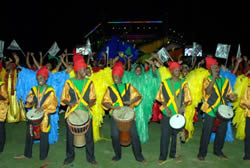 Jamaican Culture Jamaican Culture
People flock to Jamaica to savor and experience the warmth and congeniality of the Jamaican culture which is what sets this island apart from other Caribbean destinations. Jamaica represents a rich blend of cultures that have landed on the island’s shores over the past several centuries. In Jamaica you will find people of all ethnic backgrounds and languages living and working together.
The island was discovered by Christopher Columbus in 1494. The original settlers, the native Taino Indians inhabited the island for centuries, but were conquered by the Spanish in the early 16th century. The Spanish were conquered by the British; and England seized the island in 1655. However, it was the West African slaves who became the dominant cultural force. Jamaica gradually obtained independence and in 1958 it joined other British colonies in forming the Federation of the West Indies. In 1962 Jamaica withdrew from the federation and gained full independence.
While the island is fully independent, it is also part of the Commonwealth Caribbean. This term applies to the English speaking nations within the Caribbean and mainland, which once constituted the British Empire. In an effort to minimize their overall economic vulnerability, the independent nations of the Commonwealth Caribbean and the British crown colony of Montserrat established the Caribbean Community and Common Market in 1973. Caricom had a number of goals, the most important of which were economic integration through the creation of a regional common market, diversification and specialization of production, and functional cooperation.
In 2012, with several days of festivities, Jamaica celebrated 50 years of independence from the United Kingdom. At the same time Jamaica's star sprinter, Usain Bolt, won the 100 metres gold medal at the London Olympics. In the Jamaican capital of Kingston, thousands filled the national stadium for celebrations. In London, Jamaica's High Commissioner to Britain, Aloun Ndombet-Assamba, paid tribute to her country by stating "We have made our mark on the world, not just in athletics - although nobody can touch us - we have made our mark on the world with our culture, with our music, with our street fashion."
Language
Although the official national language is English, the primary local language is patois, or Jamaican Creole. There are many linguistic styles spoken among its residents originating from Spanish, African, English, and including Irish, British and American idioms, and even Rastafarian. The patois languages and 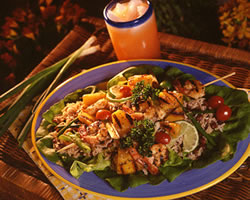 various dialects were initially developed during the period of slavery in the middle 1600’s, as a means for the black slaves to communicate with one another in a tongue unknown to their white masters at that time. various dialects were initially developed during the period of slavery in the middle 1600’s, as a means for the black slaves to communicate with one another in a tongue unknown to their white masters at that time.
Cuisine
Contributing to the unique Jamaican culture is its cuisine. Spices of the Caribbean and the island’s native ingredients create a unique fusion of flavor representing a cultural mixture of the waves of immigration over the centuries. Today, dishes which grace nearly every Jamaican menu include curry goat, fried plantain, steamed cabbage, rice and peas (pigeon peas, locally known as “gungo peas”), “jerk”, ackee and salt fish (cod) (which is the national dish), pilau (contains rice, a mixture of chicken, pork, shellfish, fish, shrimp crab which is similar to the Latin dish Paella). Fried ackee fruit for breakfast, when in season, is also a 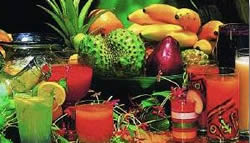 unique choice for both the native population and tourists. Jerk chicken and rice is by far the most popular item on the menu, as well as a wide variety of freshly caught local seafood. Popular soups are pepperpot soup, calloloo soup, and pumpkin soup. unique choice for both the native population and tourists. Jerk chicken and rice is by far the most popular item on the menu, as well as a wide variety of freshly caught local seafood. Popular soups are pepperpot soup, calloloo soup, and pumpkin soup.
Also popular among both the native Jamaicans and tourists today are the individual drinks of fresh soursop fruit, mango and local pineapple.
Religion
Jamaica is home to many different religions, with the Christian faith being the largest. Christian denominations on the island include Anglican, Baptist, Catholic, Methodist, Presbyterian and Seventh Day Adventists. Jamaica is said to have the most churches per square mile of any place in the world. Many of the old churches have been carefully maintained and/or restored. In addition to the Christian faith, Jews, Hindus, Muslims, Bahai’s and Rastafarians, as well assome elements of ancient African religions can be found on the island.
The Rastafarian religion, which is a folk derivative of the larger Christian culture, is one of the more prominent religions in Jamaica. Jamaica is the home of Rastafarianism, a religious movement spurred by the beliefs of the famous Jamaican Marcus Garvey and inspired by the readings of the King James Bible. They worship the Ethiopian emperor Haile Selassie, or Ras Tafari, who claims lineage from the biblical Solomon and the Queen of Seiba. Their beliefs are Christian with a Jamaican twist. They believe inreincarnation and that males should not cut or comb their hair or beards. They also believe in nurturing the inner spirit in each person and they often use marijuana as a sacrament and a meditational aid. The Rastafarian movement is evolving and its popularity has spread to many other countries in the region and around the world.
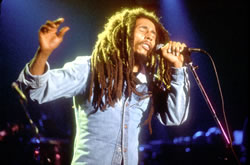 Music and Dance Music and Dance
Music and dance have always played an important role in the Jamaican culture. Christian religious celebrations and holidays were often enhanced with early folk rhythms and movements. The most well-known form of Jamaican music is reggae. The syncopated style of reggae, which is closely associated with the Rastafarian movement, arose from earlier ska rhythms. Robert Nesta Marley (Bob Marley), an exponent of the Rasta’s culture, grew to international fame with his innovative reggae style. Dancehall, a variation of reggae, is the most popular style of music throughout the island today, with jazz, rocksteady, ska, Soca and Calypso growing in popularity.
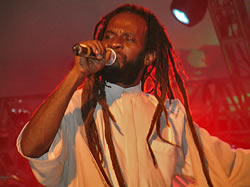 The many styles of Jamaican music have inspired many different dance styles. Ska music, with its fast beats, inspired fast dances, while the slow to rocksteady inspired slower dances. Reggae influenced many newer styles of dance and the popular dancehall, or ragga, music often creates its own dances based on the lyrics of the songs. Some of the older local dances are the “jonkonnu”, “Bruckins” and “ska.” New dances crop up constantly, but the basis for many of the new moves comes from these older European and African dances. The many styles of Jamaican music have inspired many different dance styles. Ska music, with its fast beats, inspired fast dances, while the slow to rocksteady inspired slower dances. Reggae influenced many newer styles of dance and the popular dancehall, or ragga, music often creates its own dances based on the lyrics of the songs. Some of the older local dances are the “jonkonnu”, “Bruckins” and “ska.” New dances crop up constantly, but the basis for many of the new moves comes from these older European and African dances.
Sports
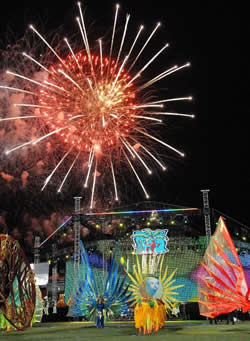 Jamaicans are very interested in sports. The most popular sports in Jamaica are: cricket, football (known as soccer to most of the world), dominoes and horse-racing. The Jamaica National Cricket Team competes inter-regionally in the Caribbean in such competitions as the Carib Beer Cup and the KFC Cup. The best players may be selected for the West Indies team. The Jamaica National Football Team, or the “Reggae Boyz,” has won the Caribbean Cup four times (1991, 1998, 2005 and 2008) and qualified for the 1998 FIFA World Cup. The Jamaican Women’s National Football Team, nicknamed the “Reggae Girlz” is one of the top women’s national football teams in the Caribbean region. The first Jamaican Bobsled Team made history in the 1988 Winter Olympic Games in Calgary, Alberta, Canada and was portrayed in the 1993 film Cool Runnings. Over the years, the Jamaican Bobsled Team has been a serious contender in the Winter Olympics, beating many well-established teams. Jamaicans are very interested in sports. The most popular sports in Jamaica are: cricket, football (known as soccer to most of the world), dominoes and horse-racing. The Jamaica National Cricket Team competes inter-regionally in the Caribbean in such competitions as the Carib Beer Cup and the KFC Cup. The best players may be selected for the West Indies team. The Jamaica National Football Team, or the “Reggae Boyz,” has won the Caribbean Cup four times (1991, 1998, 2005 and 2008) and qualified for the 1998 FIFA World Cup. The Jamaican Women’s National Football Team, nicknamed the “Reggae Girlz” is one of the top women’s national football teams in the Caribbean region. The first Jamaican Bobsled Team made history in the 1988 Winter Olympic Games in Calgary, Alberta, Canada and was portrayed in the 1993 film Cool Runnings. Over the years, the Jamaican Bobsled Team has been a serious contender in the Winter Olympics, beating many well-established teams.
In athletics, Jamaica is a giant, garnering 66 Olympic medals in track and field, with 17 gold medals leading the way. Jamaica's Usain Bolt is touted as the world's fastest man. He clocked 9.69 seconds in the 100 meter dash at the 2008 Beijing Summer Olympics and then broke his record with a time of 9.63 seconds at the 2012 London Summer Olympics. Bolt won three gold medals defending his Olympic titles for events he participated in during the 2008 Beijing Summer Olympics. He became the first athlete in Olympic history to successfully defend his title in the men's 200 metres. He also became Jamaica's first male flag bearer at the opening ceremony since 1984. Yohan Blake, Shelly-Ann Fraser-Pryce and Veronica Campbell-Brown all received multiple medals as well in the 2012 London Summer Olympics. Shelly-Ann Fraser-Pryce and Veronica Campbell-Brown were Olympic champions from Beijing.
Additional Links
https://en.wikipedia.org/wiki/Jamaica
https://www.visitjamaica.com/
https://reggaesumfest.com/
https://en.wikipedia.org/wiki/Jamaica_at_the_Olympics |

